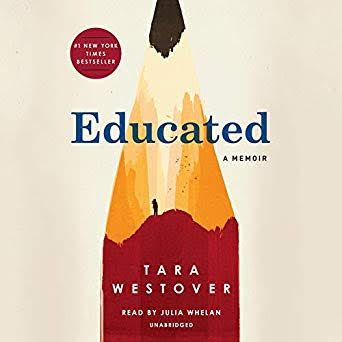"Educated" by Tara Westover

Above: "Educated." Tara Westover. 332 pages.
I'd like to read the other side of the story. But, I suspect that Tara's parents are not the type of people who would publicly trash their daughter, however they felt about her privately.
I completed reading this book today.
This New York Times bestseller memoir, published in 2017, is loved by the blue state, educated class. The Obamas tout the book. Amy Chua lauds the author's "escape from violence and emotional prison."
Tara Westover chronicles the journey she took from being part of a fundamentalist family, home schooled without even a birth certificate, subject to physical abuse by a bi-polar brother, and mental abuse by a righteously indignant father, to becoming recipient of a PhD in history from Cambridge University and... to becoming alienated from her mother and father.
Westover's family lived in southern Idaho and were members of the Mormon (term used in the book) Church. Dad had a distrust of the US government and Mom, a midwife, though not as passionately libertarian as her husband, dutifully cooperated with him.
Public schools to Dad were anathema... being the purveyors of socialism and destructive of traditional values. For Tara's dad, reliance on homeopathic medical care, avoidance of immunizations, and ecclesiastical blessings, were the proper way to deal with sickness. Doctors' solutions were not trusted. Stereotyped, Tara Westover's family were hayseed, "deplorables" clinging to their Bibles and guns.... ughhh...Trump voters.
The author asks us to not type-cast the LDS as supportive of, or representative of the type of family in which she was raised. She says there are good people and bad people in all institutions.
Tara Westover acknowledges the help along the way from "more conventional" LDS members when she arrived, clueless as to mainstream conventions, at Brigham Young University... supportive boy friends, an LDS bishop who drew from his own funds to see that she could take the next step up the educational ladder.
Raised LDS, I never met any church members like Tara's family. I had my measles shots, went to the dentist, and saw the doctor when I was sick... as did all the LDS people I knew.
Still, something about Tara Westover's narrative rings cold to me. Tara Westover's anecdotes about her emergence from the dark side into elite enlightenment fit too neatly into "blue state" stereotypes of "deplorable" life.
Even the "more rational, mainstream" Mormons were not off limits for Tara's ridicule. One LDS boyfriend at BYU insisted to her that "a woman's place is in the home." While LDS Church leaders over the years have emphasized the importance of moms staying home to raise children, the growing number of LDS professional women, and evolving approbation of same by the Church, belies the stereotype. I don't think most male students at BYU over the last ten years would say "a woman's place is in the home" in the explicit, stereotyped way described in her narrative.
Tara has five siblings. Two of them went on to achieve professional degrees, work at responsible jobs, and raise families. The other three stayed close to home and ended up working in the family's multimillion dollar sales homeopathic essential oils business. None of the other siblings, neither the "educated" ones nor the ones who stayed close to home, became estranged from their parents.
Is Tara's family so dysfunctional? No family is perfect. But, looking at the scoreboard for Tara's family, her parents seem to have done a pretty good job. Nobody in jail. Lots of grand kids. Everybody working. A multimillion dollar business operation. Tara's own success must have surely been helped by her having to overcoming the obstacles she describes in her early family life.
Tara's educational accomplishments are no doubt impressive. But her bashing of her "deplorable" parents and story of her own escape from family tyranny, for me, is a little too contrived and self serving. Reaching out, seeking to reconcile, Mom and Dad paid Tara a visit when she was at Harvard. Dad wanted to give her a father's blessing, a family/religious ordinance in Mormondom. That's what he knew. He believed in what Mormons call priesthood power to resolve conflict to gain God's assistance to resolve a family conflict.
Tara refused the blessing. She disrespected her father 's peace offering. The blessing meant a lot to the father...but, nothing to Tara. But, Tara, what does it hurt to honor your father and receive his blessing as a sign of respect and a symbol of reconciliation, even if you don't believe in the ordinance's religious efficacy?
The book is well - and cleverly - written... reads fast.... . Read it if only to understand what educated blue America is into ie. deplorable bashing. But, a thoughtful reader grounded in reality will easily detect cleverly worded, politically correct stereotyping throughout the narrative, not to mention Tara's sad selfishness in refusing to honor a father and mother who, "uneducated" though they seemed, did the best they could...and overall, not too bad at that.
I'd like to read the other side of the story. But, I suspect that Tara's parents are not the type of people who would publicly trash their daughter, however they felt about her privately.